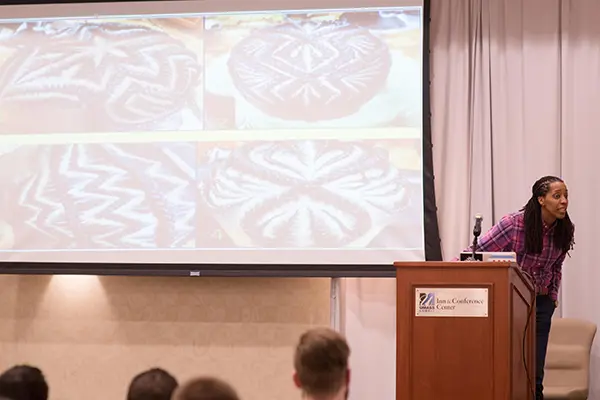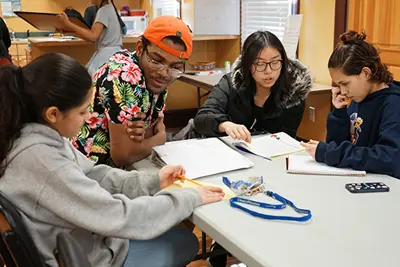Hip Hop Education Expert Says Arts and Social Justice Drive Learning
 Image by Tory Wesnofske
Image by Tory Wesnofske
04/19/2018
By Katharine Webster
Children of color arrive at urban schools with amazing cognitive and social skills they’ve developed through music, dance and art.
Then they’re told to sit down and keep quiet.
No wonder they check out, says Bettina Love, an associate professor of education at the University of Georgia.
“You have to know students’ culture and the beauty of their culture to drive the classroom,” Love told more than 250 students and educators at the College of Education’s Spring Symposium. “We don’t know how to tap into that culture and push them beyond what they see themselves doing.”
The College of Education hosts a symposium on teaching and learning each semester for students, alumni, teachers and educational leaders from area schools. For the past two years, the symposium has focused on better educating children who are learning English. This year, the focus was on urban youth and social justice in education.
 Image by Tory Wesnofske
Image by Tory Wesnofske
Love told the room of mostly white teachers that they need to understand the vital role the arts play in African-American, Asian, Native American and Hispanic culture. The arts help young people express their sadness, anger and fear about discrimination and oppression – and build better lives and communities.
“Young kids in their communities are using their cultures to heal themselves. They’re developing great social and emotional intelligence and all these cognitive skills that we say we want our students to have,” she said. “They already have them.”
Love said that in African-American culture, arts and social justice are inextricably linked, from the drums and songs that Southern slaves used to pass coded messages to the critiques of inequality and injustice expressed by hip-hop today. Both of them, and every form of African-American music and dance created in between, have their roots in West African music.
“Hip-hop has unbelievable roots, and those roots are the basis of a culturally relevant pedagogy,” she said. “We have to get back to the point where we teach (children) about social justice citizenship. We have to be as creative as possible to fight injustice, and we have to do it out of love and joy.”
Love criticized the “grit” movement that tells children from impoverished communities that their educational achievement is their personal responsibility while ignoring racism, income inequality and the school-to-prison-to-deportation pipeline. “Black and brown” children have plenty of grit, she said. They just don’t have the same resources and opportunities.
“We don’t have an achievement gap. We have an opportunity gap,” she said.
After her talk, dancers from AfroFusion, part of the Teen BLOCK program at Lowell Community Health Center, performed to a mix of hip-hop music, popping and locking and breaking to applause and cheers.
Then the Lowell teenagers, along with two groups of high school students from Rhode Island, spoke in a breakout session about what’s missing from their education, especially in-depth history classes about their own racial and ethnic roots. The Southeast Asian students, in particular, said they feel disconnected from their history: Their parents and grandparents still suffer from trauma due to the wars in Vietnam, Laos, Cambodia and Burma – and they won’t talk about the past.
Love told the teens it’s important to educate themselves and build community while getting others involved. And she told them they need to take the long view.
“The work you’re doing now, you’re doing it to be somebody’s ancestor,” she said. “You tear something down, you build something better, and you do it with love and black joy.”




